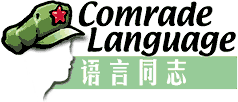When the Comrade was a tyke, the last thing anyone worried about was
losing weight. Emaciation was a way of life. We ate chicken once a year
at the time of 春节 chunjie (Spring Festival). Kids were so skinny they
used to run through closed doors and play games like 'dodge the raindrops.'
Then came 经济改革开放 jingji gaige kaifang (Reform and Opening), which
paved the way for a new social problem 胖子 pangzi (obesity). Thanks
to economic reforms, Chinese people's 生活水平 shenghuo shuiping (standard
of living) has reached its highest levels in 5000 years. The 老百姓
laobaixing (common people) are eating the same 垃圾食物 lajishiwu (junk
food) and 快餐 kuaican (fast food) consumed by their rich western counterparts.
Now that Chinese people are eating like Americans, they're starting
to look like Americans. The irrefutable result of consuming excessive
amounts of refined sugars, empty calories and nutritionless garbage
is a 明显mingxian (noticeable) increase of unsightly 脂肪 zhifang (n.
fat).
Of course, it's fine for men to be 胖 pang (adj. fat). 菩萨 Pusa (Buddha)
is fat. 毛 Mao was fat. Chinese women are more attracted to fat men
than thin ones. For men, being fat is a symbol of wealth, abundance
and excess.
As a matter of fact, most fat Chinese men are rich. They eat big and
frequent meals, take taxis instead of riding bicycles, walk very slowly
and sleep at least 12 hours a day.
Chinese women, on the other hand, take great pains to keep 苗条 miaotiao
(slender). Many practice 节食 jieshi (fasting) and take up 吸烟 xiyan
(smoking cigarettes) in order to 减肥 jianfei (lose weight). Chinese
women are suckers for fad diets, just like their western counterparts.
After they get home from the discos at 3 a.m. or so, they turn on the
TV and stare wide-eyed at infomercials promoting the latest 窍门 qiaomen
(trick) for losing weight.
One recent weight-loss scam is 瘦身 shoushen (literally Thin Body).
Gullible women hand over handfuls of money to get hooked up to electrodes
and have their bodies smeared with some kind of 药膏 (medicinal paste).
If all that sounds too complicated, why not try 减肥茶 jianfeicha (weight-loss
tea) or weight-loss sucking candies and cookies? The most 实际 shiji
(practical) weight-loss product is the 运动裤 yundongku (weight-loss
pants), which actually have no weight-reduction capability. They simply
act as a girdle, holding in your beer belly or saggy butt. The sad truth
about weight-loss is that there are no shortcuts to getting in shape.
If you sleep until noon every day, shop for shoes and cosmetics all
afternoon, and eat hotpot until the wee hours of the night, no weight-loss
product can help you. You must accept the fact that the three biggest
因素 yinsu (factors) affecting your weight are diet, exercise and stress.
Diet 饮食 Yinshi
You'll never get thin if you keep eating fattening foods.
Junk food (including fast food) and booze are as fattening as a university
总机 zongji (telephone operator) is lazy. If you want to lose weight,
cut them out of your diet. Drink water instead of soda. Other fattening
foods that are high in sugar and 碳水化合物 tanshuihuahewu (carbohydrates)
are bread,
rice, noodles and fruit.
The right ratio of 蛋白质 danbaizhi (protein) to carbohydrates and fat,
balanced with adequate nutrients and minerals from green vegetables,
is the key to a successful diet. Simply cut down on carbohydrates and
compensate by eating more 高蛋白 gaodanbai (high protein) foods such
as lean meat, fish and eggs.
(Note: 节食 jieshi or fasting is not only a sure-fire way to reduce
your body weight, it's also the perfect excuse to leave your entire
meal on the table, untouched, for everyone to see, when you leave a
restaurant).
Exercise 运动 Yundong
Sorry, a night of 跳舞 tiaowu (dancing) at the disco doesn't
count as exercise. The role of exercise in weight-loss is to burn up
body fat and extra calories that would otherwise be stored as fat. 有氧操
Youyangcao (aerobic) exercise is the most effective way to lose weight.
The idea is to get your heart beating fast for an extended length of
time.
Many people mistakenly believe that somehow body fat can be sweated
away.
In fact it must be burned through rigorous aerobic exercise. Good aerobic
exercises include 骑自行车 qi zixingche (bicycle riding) and 跑步 paobu
(running). If you have access to a 健身房 jianshenfang (gym), try the
登山机 dengshanji (stairmaster) or 健美体操 jianmei ticao (aerobics
classes). Don't forget the mandatory workout apparel: fat-accentuating
spandex. And remember, 苦尽甘来 kujin ganlai (no pain, no gain)!
Pressure; Stress 压力 Yali
What does stress have to do with weight gain? Comrade
neuroscientists at the University of Virginia in the US have -- 研究
yanjiu (studied) the relationship between stress and glucose. During
times of stress, glucose is released by the hormone epinephrine (adrenaline).
Excess glucose can 刺激 ciji (stimulate) the fat enzyme, lipoprotein
lipase. The result is excess stored body fat. Also, during stress the
body craves very high fat, high glycemic foods in order to balance out
anti-stress chemicals.
You're probably wondering whatever in the world could cause stress in
a Chinese person's life. Luckily the Comrade has prepared the following
list
of the top ten things that cause us Chinese to feel stressed:
10. Trying to decide what to eat for 早饭 zaofan (breakfast)
9. 装修房子 zhuangxiu fangzi (renovating an apartment)
8. Planning a 婚礼 hunli (wedding)
7. 麻将 Majiang (Mah-jongg)
6. Trying to decide what to eat for 午饭 wufan (lunch)
5. Juggling a wife and a girlfriend
4. Worrying about whether or not the kid will pass college entrance
exams
3. Hoping to have a son
2. Trying to decide what to eat for 晚饭 wanfan (dinner)
And the number one cause of stress is:
1. 股票市场 Gupiao shichang (the stock market)
